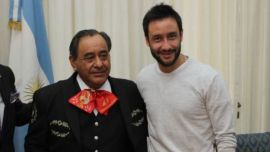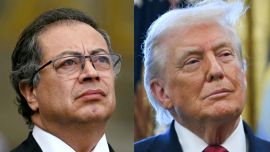Hard to fathom the worldwide impact of the shock collapse of Afghanistan into Taliban hands last weekend but perhaps it lies in being a dramatic illustration of the sheer speed of change in today’s world (to which that thuggish theocracy hardly seems to belong). Otherwise, who cares, one might think, if one Ghani (the Mullah Abdul Ghani Baradar Akhund) replaces another Ghani (ousted president Ashraf) in a nation with the planet’s 178th per capita income, the lowest worldwide outside Africa?
Comparisons were immediately made with the fall of Saigon in 1975 yet that came 27 months after the United States military withdrawal, not 50-odd days. But what crossed my mind was a comparison with Afghanistan itself – when the Soviets began pulling out in 1988 after losing over 15,000 soldiers in a grim decade-long struggle with the mujahideen, from my standpoint of the Buenos Aires Herald newsroom (with its strong international focus), I was expecting the pro-Moscow puppet Mohammad Najibullah to fall at least as fast as Ashraf Ghani now but he somehow clung on for four more years while his successors kept the Taliban out of Kabul and some non-Pashtun regions until 1996 (when in their sublime indifference to world opinion the Taliban conquerors dragged Najibullah out of his United Nations sanctuary and tortured him to death). Against that history the total lack of fight in a superbly equipped Afghan army of 300,000 against a few thousand Kalashnikovs or the absence of the Tajik-led Northern Alliance of the past century becomes even more mystifying.
Afghanistan was on the radar from my earliest days at the Herald in the last months of the 1976-1983 military dictatorship then incurring in the supreme contradiction of making wheat sales to a Communist superpower a prime source of revenue in defiance of an international boycott of the Soviet Union extending to the 1980 Moscow Olympics, following the Kremlin’s 1978 invasion of Afghanistan. But my first memories of Afghanistan go back to early childhood – history book etchings of William Brydon (an Indian Army doctor like the Watson of Sherlock Holmes fame whose military career ended at another Afghan Ghazi massacre of British forces, at Maiwand in 1880) riding his dying steed into Jalalabad fort as the only known survivor of the retreat from Kabul of an Anglo-Indian 1841-1842 winter expedition of 16,000 men. Afghanistan inspired perhaps the shortest poem in the English language: “The Akund of Swat/Is not” when British troops bumped off that ferocious Ghazi chieftain. In mid-century Britain, where the oldest remembered Queen Victoria’s Diamond Jubilee, phrases like the “Great Game” (against Russia), the Northwest Frontier and the Pathans (as the Pashtuns were then called) all bulked large in the folk memory.
All too much past and present for Afghanistan but what about the future? The fast forward to the past indicates that nothing is irreversible. The Talibans may not have “come back better” any more than Kirchnerism here but things have changed rather more in the past two decades than their effortless return to power might indicate – both in Afghanistan and in the world at large. More than two-thirds of Afghans now have mobile telephones (an item banned under the 1996-2001 emirate), thus opening up their horizons to things like Facebook and Twitter which did not even exist during their previous regime. For somebody whose geography teachers taught him that Afghanistan is a sparsely populated, mountainous country, it comes as a surprise to learn that today it has almost as many people as Argentina (39 million), having more than trebled its population from the war-torn country evacuated by the Soviets only three decades ago. And quite apart from this multiplication of needs which any new government must satisfy, millions of these new Afghans are inevitably women, many of whom have acquired schooling and jobs in the intervening two decades. Should feminist resistance take the form of some Afghan version of Mothers of Plaza de Mayo, could the Taliban theocracy counter this any more than the military dictatorship here?
Let us take the comparisons with Argentina one step further. Not entirely oblivious of the changing world around them, the Talibans are preaching sweetness and light (including respect for women’s rights within “an inclusive Islam,” as well as disavowing any terrorist havens) – could that go as far as digging up their own Alberto Fernández as their visible face? Hard to see who might fit that bill. The Mullah Baradar is at least less sanguinary than the warlords but unconvincing as a 1994 co-founder of the Taliban movement – perhaps the 2001-2014 ex-president Hamid Karzai might be the closest Afghan equivalent of an Alberto. While speculating as to who might be Alberto, it might also be asked who would be the Cristina among the Taliban hardliners but this really stretches comparisons. Their supreme military commander Maulawi Hibatullah Akhunzada is so rabidly committed to suicide missions that he sent his son on one, an Abraham who did sacrifice his Isaac – not even Cristina’s most vehement critic could suspect her of doing that to Máximo. Argentina is not Afghanistan even less than it is Venezuela.
Apart from more complex internal fronts, the Talibans have to deal with a more complicated world – far more globalised even in the midst of a coronavirus pandemic. Their emirate at the end of the last century was barely aware of any outside world, apart from the United States about which it had a one-track mind. Facing a multipolar world rather than a superpower might seem to make their lives easier but how do you go about a partnership with a China treating its own Muslims in Xinjiang so horribly?
And even if the Talibans find a way of ignoring the world, the world cannot afford to ignore Afghanistan, black hole though it might be into which billions of dollars have been poured all this century with no apparent result. That remote country is said to harvest some 90 percent of the world’s opium – this makes anybody think of drug-trafficking (whose admittedly formidable volume is often overrated) but opiates are also essential ingredients in perfectly legal painkillers, an exponentially growing part of modern medicine.
Just three weeks from today we will be marking the 20th anniversary of the 9/11 Twin Towers and once again Afghanistan with its horrors is on our minds.



















Comments